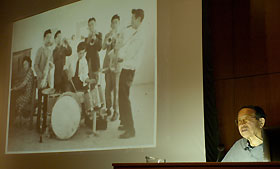For more archives, go to the Advance Archive/Search Page.
Swing Bands Helped Ease Hardships
Of Internment, Speaker Says
George Yoshida says the Arizona internment camp where he and 10,000 other Japanese-Americans were confined from 1942 to 1945 was "hot as hell in the summer, and bitter cold in the winter." When the wind blew, the sand pushed through the walls and floors of their makeshift, tarpaper-roofed homes. The hardships were constant.

|
|
George Yoshida describes his experiences during his interment during World War II. Behind
him is a photograph of his former band.
Photo by Peter Morenus
|
But despite all the physical trials and tribulations, he says, "the true pain we suffered was being labeled enemy aliens" by none other than the President of the United States.
Addressing an audience of about 150 people in Konover Auditorium on Feb. 19, UConn's annual Japanese-American Remembrance Day, Yoshida described the injustice of the internment, and the role that music played in helping some of the detainees cope with their situation.
Born in Seattle, Wash., Yoshida moved to Los Angeles in 1936, where he worked in a grocery store, attended a local high school, and enrolled in Los Angeles City College in 1940. He loved Big Band music and Duke Ellington. He was an all-American boy.
Then the Japanese bombed Pearl Harbor, and Americans were filled with anger, fear, and hatred, he said. "'You can't trust Japs. Put 'em all away,'" he remembers hearing people say. "Whites couldn't see us as Americans."
He said he tried to shed his Japanese-American identity: "'I'm not a Jap,' I kept telling myself. I got rid of all my Japanese books, papers, and records. I kept repeating, 'I'm not a Jap; I'm not a Jap. I'm an American. I say the Pledge of Allegiance every day.'
"But I could not change my Jap face," Yoshida said.
"Families were intimidated, and some people were even murdered," he continued. "I'm reminded of the racial profiling that many Americans of Middle Eastern descent face today."
In early 1942, America went beyond racial profiling. Within weeks, more than 120,000 Japanese-Americans were taken to 10 detention camps spread across Arizona, Utah, Colorado, and elsewhere, mostly in the vast open spaces of the American West.
"It was a dark time for Japanese-Americans and anyone else who was a champion of civil and human rights," Yoshida said.
"We were rounded up, regardless of age, sex, or citizenship. Babies, the infirm, the blind and the paralyzed, and even the very elderly," he said. "Two-thirds of the people taken to the camps were American citizens, but the president thought we were capable of espionage and sabotage."
The prisoners, Yoshida says, kept busy in the camps. They built schools, hospitals, and community centers, and cleared land to plant vegetable gardens, and develop chicken and pig farms. Scrap wood was prized so families could fashion desks, tables, and beds, as the buildings they were placed in had nothing more than an overhead light.
Before long, Yoshida, who loved the Big Band sound before he was sent to the camp, decided his camp needed entertainment, and he formed a Big Band of his own, the Music Makers. After work, he and his friends played dance music by Benny Goodman, Glen Miller, and Duke Ellington.
Detainees at eight of the other camps also formed swing bands - The Stardusters, The Jive Bombers, and The D-Elevens. A band in the Heart Mountain, Wyo., camp was invited several times by outside groups to entertain at dances and benefits for war bonds. One band played at a local high school prom. The Jive Bombers, their speakers facing the guard post at another camp, occasionally played - loudly - the popular tune "Don't Fence Me In."
Music and dance, said Yoshida, made the time spent in the camps slightly more bearable.
Author of Reminiscing in Swingtime: Japanese Americans in American Popular Music, 1925-1960 , and founder of the San Francisco-based swing band, J-Town Jazz Ensemble, he did his best to entertain the UConn audience, too. At one point, Yoshida, who will be 82 in April, pulled a member of the audience onto the stage for an impromptu jitterbug, as "In the Mood" sounded in the background.
In 1945, the camps were closed, a decision made partly in response to the heroic efforts of Japanese-Americans who fought for the United States overseas. Yoshida himself was subsequently inducted into the U.S. Army and trained with the Military Intelligence Service Language School at Fort Snelling, Minn.
Even the closure of the camps was done poorly, he recalled.
"We were told one day to just pack up and go home. But most of us had no home to go back to. We had no jobs, no farms, no businesses that awaited us back home," he said. "It was a crucial and demanding time."
The post-war period became a time for healing, but healing was slow, and America was slower still to admit its mistake. Not until 1980, under then-President Jimmy Carter, did the country begin trying to rectify the error. Public hearings were held and eventually Congress issued a formal apology to the citizens it had interned. A decision to award each of the 60,000 detainees who were still alive $20,000 in restitution was finally implemented in 1990.
On the 62nd anniversary of the travesty, Yoshida offered a fervent wish: "May this story never be repeated."

